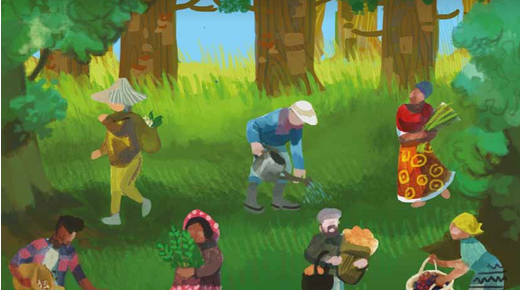
Across the world, forests, trees on farms, and agroforestry systems play a crucial role in the livelihoods of rural people by providing employment, energy, nutritious foods and a wide range of other goods and ecosystem services. They have tremendous potential to contribute to sustainable development and to a greener economy. Yet, clear evidence of this has been lacking.
FAO’s flagship publication The State of the World’s Forests (SOFO) focuses on the socioeconomic benefits derived from forests while addressing this knowledge gap and showing that a significant proportion of the world population relies on forest products to meet basic needs for energy, shelter and some aspects of primary healthcare – often to a very high degree.
The reports highlights how forests contribute to basic needs and rural livelihoods while having a crucial role in preserving biodiversity and as carbon sink. The role of forests in food security and sustainable development is also often overlooked, but it is essential.
Moreover, the reports finds that national policy and regulatory frameworks for forests, especially for FGR are, in general, partial, ineffective or non-existent despite their enormous potential to contribute to poverty reduction, rural development and greener economies.
Looking at the report outcomes, some data are impressive: FAO estimates that close to 1.6 billion people – more than 25 percent of the world’s population – rely on forest resources for their livelihoods. The forest products industry alone is a major source of economic growth and employment: some 40 percent of this value is generated in developing countries, where forest-based employment provides 49 million jobs.
Moreover, wood appears to be a major source of household energy, but it’s often overlooked in policies. In many developing countries, wood energy is often the only accessible and affordable fuel for the majority of people, meeting in some cases as much as 90 percent of energy requirements. One in three households uses wood as their main fuel for cooking.
As an additional example, harvesting of non-wood forest products (NWFPs, such as food and other plant products, wild honey, ornamental plants, plant materials for medicines, exudates, etc) from trees and forests in impoverished rural areas provides income-earning opportunities for women in particular, contributing to gender equality, according to the FAO’s report.
The CMCC was concerned in forest heritage assessment, conservation and sustainable management in particular with several projects of the IAFENT (Impacts on Agriculture, Forest and Natural Ecosystems) Division which is mainly focused on the diagnosis and forecast of climate change impacts on agriculture and on natural and semi-natural earth ecosystems. Among these projects are in particular the GEOCARBON, ClimAfrica, and LUC4C projects.
Geocarbon – Operational Global Carbon Observing System is a project with a global perspective, with the ultimate aim to lay the foundations for an operational Global Carbon Observing and Analysis System in support to both science and policy.
ClimAfrica – Climate change predictions in Sub-Saharian Africa: impacts and adaptations is a project conceived to respond to the urgent international need for the most appropriate and up-to-date tools to better understand and predict climate change in Africa, assess its impact on African ecosystems and population, and develop the correct adaptation strategies.
Both Geocarbon and ClimAfrica support GlobAllomeTree, an international web platform for tree allometric equations (i.e. the statistical models that use the relationships between tree characteristics to calculate tree volume and biomass) to support volume, biomass and carbon stock assessment. Allometric equations can in fact be used to assess many forest services, as timber production but also climate change mitigation through forestry sector for example.
Finally, LUC4C – Land use change: assessing the net climate forcing, and options for climate change mitigation and adaptation is a project which aims at advancing our knowledge of the climate change – land use change interactions while developing a framework for the synthesis of complex earth system science into guidelines that are of practical use for policy and societal stakeholders.


